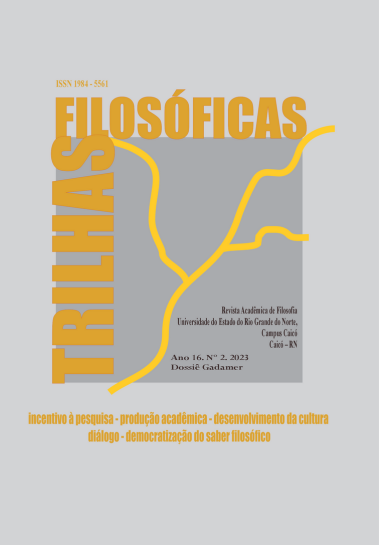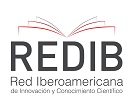Silja Freudenberger:
uma aproximação político-epistemológica entre a filosofia de Gadamer e perspectivas feministas
DOI:
https://doi.org/10.25244/tf.v16i2.5925Palavras-chave:
Hermenêutica, Feminismo, Epistemologia, Política, Hans-Georg Gadamer, Silja FreudenbergerResumo
Em The Hermeneutic Conversation as Epistemological Model (FREUDENBERGER, 2003), Silja Freudenberger indica semelhanças entre a hermenêutica gadameriana e a epistemologia feminista anglo-saxã. No escrito em questão, parece cabível atribuir à autora, com efeito, a hipótese de que as abordagens de ambas revelam paralelos cuja observação adequada é instrumental para a compreensão da recepção – em larga medida negativa – da primeira no seio da literatura filosófica desenvolvida em alinhamento à segunda. Sob a suposição da vigência dessa hipótese como diretriz chave do desenvolvimento do texto de Freudenberger, este esforço é dedicado à tarefa de reconstruir e analisar criticamente o percurso argumentativo nele trilhado pela autora. A motivação para que se leve a cabo esta tarefa é, em primeiro lugar, a visibilização da solidez de uma posição surpreendentemente minoritária em certa região da literatura filosófica feminista – a saber, aquela segundo a qual não há incompatibilidade necessária entre pensamento feminista e as diretrizes centrais da hermenêutica de Gadamer; e, adicionalmente, a exposição de certas observações de cunho histórico e contextual que explicam, até certo ponto, o estatuto minoritário dessa posição.
Downloads
Referências
ABELARDO, Pedro. Sic et non: A Critical Edition. Chicago: The University of Chicago Press, 1976.
ALCOFF, Linda. “Poststructuralism and Cultural Feminism: The Identity Crisis in Feminist Theory”. In: Signs 13 (1988): 4–36.
ALCOFF, Linda. “Continental Epistemology”. In: SOSA, Ernest e DANCY, Jonathan. A Companion to Epistemology. Oxford: Blackwell, 1992.
ALCOFF, Linda. Real Knowing: New Versions of the Coherence Theory. Ithaca: Cornell University Press, 1996.
ALCOFF, Linda; POTTER, Elizabeth. Feminist Epistemologies. New York: Routledge, 1993.
CODE, Lorraine. “Feminist Epistemology”. In: SOSA, Ernest e DANCY, Jonathan. A Companion to Epistemology. Oxford: Blackwell, 1992.
CODE, Lorraine. “Taking Subjectivity into Account”. In: ALCOFF, Linda; POTTER, Elizabeth. Feminist Epistemologies, New York: Routledge, 1993.
CODE, Lorraine. Feminist Interpretations of Gadamer. University Park: Pennsylvania State University Press, 2003.
CODE, Lorraine. “Introduction: Why Feminists Do Not Read Gadamer”. In: CODE, Lorraine. Feminist Interpretations of Gadamer. University Park: Pennsylvania State University Press, 2003.
CODE, Lorraine. “What is Natural About Epistemology Naturalized?”. In: American Philosophical Quarterly 33 (1996): 1–22.
DALMIYA, Vrinda; ALCOFF, Linda. “Are ‘Old Wives Tales’ Justified?”. In: ALCOFF, Linda; POTTER, Elizabeth. Feminist Epistemologies. New York: Routledge, 1993.
DAVIDSON, Donald. Inquiries into Truth and Interpretation. Oxford: Clarendon Press, 1984.
FIUMARA, Gemma. “The Development of Hermeneutic Prospects”. In: CODE, Lorraine. Feminist Interpretations of Gadamer. University Park: Pennsylvania State University Press, 2003.
FLEMING, Marie. “Gadamer’s Conversation Does the Other Have a Say?”. In: CODE, Lorraine. Feminist Interpretations of Gadamer. University Park: Pennsylvania State University Press, 2003.
FREUDENBERGER, Silja. “The Hermeneutic Conversation as Epistemological Model”. Trad. Melanie Richter-Bernberg. In: CODE, Lorraine. Feminist Interpretations of Gadamer. University Park: Pennsylvania State University Press, 2003.
GADAMER, Hans-Georg. “Das Problem der Geschichte in der neueren deutschen Philosophie“. In: GADAMER, Hans-Georg. Hermeneutik II: Wahrheit und Methode. Tübingen: J. C. B. Mohr, 1943.
GADAMER, Hans-Georg. “Was ist Wahrheit?“. In: GADAMER, Hans-Georg. Hermeneutik II: Wahrheit und Methode. Tübingen: J. C. B. Mohr, 1957.
GADAMER, Hans-Georg. “Rhetorik, Hermeneutik, und Ideologiekritik. Metakritische Erörterungen zu Wahrheit und Methode“. In: Hermeneutik II: Wahrheit und Methode. Tübingen: J. C. B. Mohr, 1967.
GADAMER, Hans-Georg. “Klassische und philosophische Hermeneutik“. In: GADAMER, Hans-Georg. Hermeneutik II: Wahrheit und Methode. Tübingen: J. C. B. Mohr, 1968.
GADAMER, Hans-Georg. “Zwischen Phänomenologie und Dialektik. Versuch einer Selbstkritik“. In: GADAMER, Hans-Georg. Hermeneutik II: Wahrheit und Methode. Tübingen: J. C. B. Mohr, 1985.
GADAMER, Hans-Georg. Hermeneutik I. Wahrheit und Methode. Grundzüge einer philosophischen Hermeneutik, 6th ed. (Gesammelte Werke, vol. 1). Tübingen: J. C. B. Mohr, 1990.
GANDER Hans-Helmuth. “Gadamer: the universality of hermeneutics”. In: MALPAS, Jeff; GANDER, Hans-Helmuth. The Routledge companion to hermeneutics. New York City: Routledge, 2015.
HARAWAY, Donna. “Situated Knowledges: The Science Question in Feminism and the Privilege of Partial Perspective”. In: Feminist Studies 14 (1988): 575–99.
HARAWAY, Donna. “Situated Knowledges: The Science Question in Feminism and the Privilege of Partial Perspective”. In: HARAWAY, Donna. Simians, Cyborgs, and Women: The Reinvention of Nature. London: Free Association Books, 1991.
HARDING, Sandra. Whose Science? Whose Knowledge? Thinking from Women’s Lives. Ithaca: Cornell University Press, 1991.
HARDING, Sandra. Das Geschlecht des Wissens. Frauen denken die Wissenschaften neu. Frankfurt am Main: Campus Verlag, 1994 [Trad. para o alemão de HARDING, Sandra. Whose Science? Whose Knowledge? Thinking from Women’s Lives. Ithaca: Cornell University Press, 1991.]
HARDING, Sandra. “Rethinking Standpoint Epistemology: ‘What Is Strong Objectivity?’”. In: ALCOFF, Linda; POTTER, Elizabeth. Feminist Epistemologies. New York: Routledge, 1993.
HARTSOCK, Nancy. Money, Sex, and Power: Toward a Feminist Historical Materialism. Boston: Northeastern University Press, 1983.
HAYLES, Katherine. “Searching for Common Ground”. In: SOULE, M; LEASE, G. Reinventing Nature? Responses to Postmodern Deconstruction. Washington D.C.: Island Press, 1995.
HOFFMANN, Susan-Judith. “Gadamer’s Philosophical Hermeneutics and Feminist Projects”. In: CODE, Lorraine. Feminist Interpretations of Gadamer. University Park: Pennsylvania State University Press, 2003.
MOULTON, Janice. “A Paradigm of Philosophy: The Adversary Method”. In: HARDING, Sandra; HINTIKKA, Merrill. Discovering Reality, Dordrecht: Springer Dordrecht, 1983.
NYE, Andrea. Words of Power: A Feminist Reading of the History of Logic. New York: Routledge, 1991.
PAPPAS, Robin; COWLING, William. “Toward a Critical Hermeneutics”. In: CODE, Lorraine. Feminist Interpretations of Gadamer. University Park: Pennsylvania State University Press, 2003.
QUINE, Willard Van Orman. Word and Object. Cambridge, Mass.: M. I. T. Press, 1960.
SCHOTT, Robin May. “Gender, Nazism, and Hermeneutics”. In: CODE, Lorraine. Feminist Interpretations of Gadamer. University Park: Pennsylvania State University Press, 2003.
Downloads
Publicado
Como Citar
Edição
Seção
Licença
Copyright (c) 2024 Luana Goulart

Este trabalho está licenciado sob uma licença Creative Commons Attribution-NonCommercial-ShareAlike 4.0 International License.
DECLARAÇíO DE DIREITO AUTORAL
1 Ao submeter trabalhos í revista Trilhas Filosóficas, caso este seja aprovado, o autor autoriza sua publicação sem quaisquer ônus para a revista ou para seus editores.
2 Os direitos autorais dos artigos publicados na Trilhas Filosóficas são do autor, com direitos de primeira publicação reservados para este periódico.
3 Fica resguardado ao autor o direito de republicar seu trabalho, do modo como lhe aprouver (em sites, blogs, repositórios, ou na forma de capítulos de livros), desde que em data posterior fazendo a referência í revista Trilhas Filosóficas como publicação original.
4 A revista se reserva o direito de efetuar, nos originais, alterações de ordem normativa, ortográfica e gramatical, com vistas a manter o padrão culto da língua, respeitando, porém, o estilo dos autores.
5 Os originais não serão devolvidos aos autores.
6 As opiniões emitidas pelos autores são de sua inteira e exclusiva responsabilidade.
7 Ao submeterem seus trabalhos í Trilhas Filosóficas os autores certificam que os mesmos são de autoria própria e inéditos, ou seja, não publicados anteriormente em qualquer meio digital ou impresso.
8 A revista Trilhas Filosóficas, motivada em dar ampla divulgação das publicações, poderá replicar os trabalhos publicados nesta revista, através do link da edição de um número publicado, ou mesmo fornecendo o link de artigo específico publicado, em outros meios de comunicação como, por exemplo, redes sociais (Facebook, Academia.Edu, Scribd, etc).
9 A revista Trilhas Filosóficas adota a Política de Acesso Livre para os trabalhos publicados sendo sua publicação de acesso livre, pública e gratuita. Portanto, os autores ao submeterem seus trabalhos concordam que os mesmos são de uso gratuito sob a licença Creative Commons - Atribuição Não-comercial 4.0 Internacional.
10 O trabalho submetido poderá passar por algum software em busca de possíveis plágios para averiguar a autenticidade do material e, assim, assegurar a credibilidade das publicações da Trilhas Filosóficas e do próprio autor diante da comunidade filosófica do país e do exterior.
11 Mas, apesar disto, após aprovação e publicação do artigo, for constatando qualquer ilegalidade, fraude, ou outra atitude que coloque em dúvida a lisura da publicação, em especial a prática de plágio, o trabalho estará automaticamente rejeitado.
12 Caso o trabalho já tenha sido publicado, será imediatamente retirado da base da revista Trilhas Filosóficas, sendo proibida sua posterior citação vinculada a ela e, no número seguinte em que ocorreu a publicação, será comunicado o cancelamento da referida publicação. Em caso de deflagração do procedimento para a retratação do trabalho, os autores serão previamente informados, sendo-lhes garantidos o direito í ampla defesa.
13 Os dados pessoais fornecidos pelos autores serão utilizados exclusivamente para os serviços prestados por essa publicação, não sendo disponibilizados para outras finalidades ou a terceiros.




